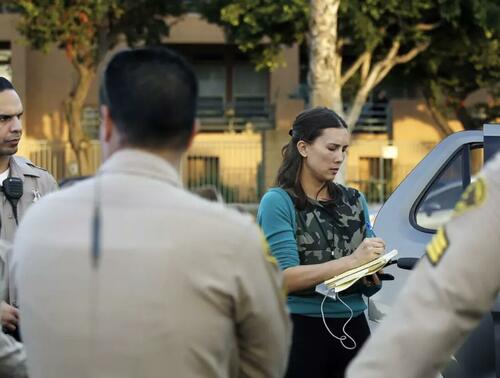
After the Los Angeles County Sheriff’s Department leaked a list of problem deputies to Los Angeles Times reporter Maya Lau, it then turned around and investigated her.
It also "urged the state attorney general to prosecute" her, according to the Los Angeles Times this week.
The investigation began in 2017 when then-Sheriff Jim McDonnell's team sought to identify who leaked a list of roughly 300 names to reporter Lau, the report says.
The case lost momentum but was revived in 2018 after Alex Villanueva took office, as revealed by a recent 300-page investigative file.
The department eventually labeled Lau as a criminal suspect for allegedly receiving "stolen property" and identified Diana Teran, its constitutional policing advisor, as the leaker, despite Teran having reported the leak and denying involvement.
In 2021, the case was sent to Attorney General Rob Bonta, whose office declined to prosecute in May, citing "insufficient evidence", the Times wrote this week.

In 2021, Lau said: “I’m glad this investigation is over, and it’s an outrage that the Sheriff’s Department would criminally investigate me as a reporter for doing my job. It’s the kind of action that’s aimed at intimidating journalists from digging into government agencies.”
“Under the leadership of Sheriff [Robert] Luna, we do not monitor journalists and we respect the freedom of the press,” the department commented this week.
David Snyder, executive director of the First Amendment Coalition, explained Lau's immunity as a journalist: “You’re not authorized to break into a file cabinet to get records. You’re not authorized to hack computers. But receiving information that somebody else obtained unlawfully is not a crime. Publishing that information is protected under the 1st Amendment.”
The leaked records at the center of the investigation date back to 2014 when Diana Teran, working at the Office of Independent Review, began compiling a Brady List of officers with problematic disciplinary histories.
Teran relied on information from the district attorney’s office and Sheriff’s Department databases but stopped adding names in late 2014, believing the Sheriff’s Department had started maintaining its own list.
In 2015, she joined the Sheriff’s Department as a constitutional policing advisor. In 2017, Teran discovered that reporter Maya Lau and others were inquiring about deputies on the Brady List, leading her to suspect her list had been leaked. She tracked down public records requests and identified similarities between her list and the reporters' list.
The case made it all the way to Attorney General Rob Bonta in 2021, who declined to prosecute due to insufficient evidence.
You can read the LA Times full story here.
After the Los Angeles County Sheriff’s Department leaked a list of problem deputies to Los Angeles Times reporter Maya Lau, it then turned around and investigated her.
It also “urged the state attorney general to prosecute” her, according to the Los Angeles Times this week.
The investigation began in 2017 when then-Sheriff Jim McDonnell’s team sought to identify who leaked a list of roughly 300 names to reporter Lau, the report says.
The case lost momentum but was revived in 2018 after Alex Villanueva took office, as revealed by a recent 300-page investigative file.
The department eventually labeled Lau as a criminal suspect for allegedly receiving “stolen property” and identified Diana Teran, its constitutional policing advisor, as the leaker, despite Teran having reported the leak and denying involvement.
In 2021, the case was sent to Attorney General Rob Bonta, whose office declined to prosecute in May, citing “insufficient evidence”, the Times wrote this week.

In 2021, Lau said: “I’m glad this investigation is over, and it’s an outrage that the Sheriff’s Department would criminally investigate me as a reporter for doing my job. It’s the kind of action that’s aimed at intimidating journalists from digging into government agencies.”
“Under the leadership of Sheriff [Robert] Luna, we do not monitor journalists and we respect the freedom of the press,” the department commented this week.
David Snyder, executive director of the First Amendment Coalition, explained Lau’s immunity as a journalist: “You’re not authorized to break into a file cabinet to get records. You’re not authorized to hack computers. But receiving information that somebody else obtained unlawfully is not a crime. Publishing that information is protected under the 1st Amendment.”
The leaked records at the center of the investigation date back to 2014 when Diana Teran, working at the Office of Independent Review, began compiling a Brady List of officers with problematic disciplinary histories.
Teran relied on information from the district attorney’s office and Sheriff’s Department databases but stopped adding names in late 2014, believing the Sheriff’s Department had started maintaining its own list.
In 2015, she joined the Sheriff’s Department as a constitutional policing advisor. In 2017, Teran discovered that reporter Maya Lau and others were inquiring about deputies on the Brady List, leading her to suspect her list had been leaked. She tracked down public records requests and identified similarities between her list and the reporters’ list.
The case made it all the way to Attorney General Rob Bonta in 2021, who declined to prosecute due to insufficient evidence.
You can read the LA Times full story here.
Loading…






